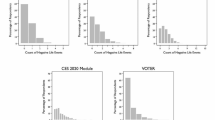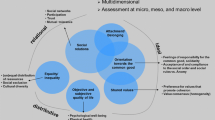Abstract
By comparing mainly religious America and secular Europe, several scholars (e.g. Harris, Paul, and Zuckerman) suggested a strong correlation between secularization (non-religiosity) and social well-being. The authors of this paper argue that the preceding thesis may be too simplistic and Western-centric. Without attempting to affirm any specific hypothesis, these authors employed exploratory data analysis and data visualization to unveil patterns found in worldwide data, including the 2013 United Nations Human Development Report, the 2014 Gallup’s Global Wellbeing Index, and the 2013 World Values Survey. It was found that the relationship between secularization and social well-being is not straightforward or clear-cut. In some cases, secularization or lack of religiosity is seemingly linked to better quality of life (e.g. disbelief and inequality-adjusted human development index), while in other cases, the relationship is reversed (e.g. skepticism and adolescent birth rate). In most situations there is no association at all.







Similar content being viewed by others
References
Archbishops’ Council. (2012). Church Statistics 2010/11: Parochial attendance, membership and finance statistics together with statistics of licensed ministers for the Church of England, January to December. Retrieved from http://www.chur-chofengland.org/media/1477827/2010_11church-statistics.pdf
Aten, J. D., & Leach, M. M. (Eds.). (2009). Spirituality and the therapeutic process: A comprehensive resource from intake to termination. Washington, DC: American Psychological Association.
Berger, P. (2014). The many altars of modernity: Toward a paradigm for religion in a pluralist age. Berlin, Germany: De Gruyter Mouton.
Berger, P., Davie, G., & Fokas, E. (2008). Religious America, secular Europe? A theme and variations. Burlington, VT: Ashgate.
Bowland, S., Edmond, T., & Fallot, R. D. (2012). Evaluation of a spiritually focused intervention with older trauma survivors. Social Work, 57(1), 73–82. doi:10.1093/sw/swr001.
Bruce, S. (2002). God is dead: Secularization in the West. New York, NY: Blackwell.
de Ridder-Symoens, H. (2003). A history of the university in Europe: Volume 1, Universities in the Middle Ages. Cambridge, UK: Cambridge University Press.
de Waal, F. (2014). The bonobo and the atheist. New York, NY: W. W. Norton & Company.
Eberstadt, M. (2013). How the West really lost God: A new theory of secularization. West Conshohocken, PA: Templeton Press.
European Social Survey. (2015). ESS data. Retrieved from http://www.europeansocialsurvey.org/
Florea, A. I., & Caudill, S. B. (2014). Happiness, religion and economic transition. Economics of Transition, 22(1), 1–12.
Friedman, J., Hastie, T., & Tibshirani, R. (2010). Regularization paths for generalized linear models via coordinate descent. Journal of Statistical Software, 23, 1–22.
Fung, D. (1998). Shèhuì zhuǎnxíng qí zhōngguó zōngjiào de shìsú huà qīngxiàng [The secular inclination of Chinese religions in the social change period]. Xuéshù jiāoliú [Academic Exchange], 5, 96–98.
Gallup. (2014). Gallup Global Wellbeing. Retrieved from http://www.gallup.com/poll/126965/gallup-global-wellbeing.aspx
Gorski, P. S., & Altinordu, A. (2008). After secularization? Annual Review of Sociology, 34, 55–85.
Harris, S. (2006). The myth of secular moral chaos. Retrieved from http://www.secularhumanism.org/index.php/articles/2863
Hill, P. C., & Pargament, K. I. (2008). Advances in the conceptualization and measurement of religion and spirituality: Implications for physical and mental health research. Psychology of Religion and Spirituality, S(1), 3–17. doi:10.1037/1941-1022.S.1.3.
Holdcroft, B. (2006). What is religiosity? Catholic Education: A Journal of Inquiry and Practice, 10(1), 89–103.
Jeong, H. O. (2010). How do religions differ in their impact on individuals’ social capital? The case of South Korea. Nonprofit and Voluntary Sector Quarterly, 39(1), 142–160.
Koenig, H., & Bussing, A. (2010). The Duke University Religion Index (DUREL): A five-item measure for use in epidemiological studies. Religions, 1, 78–85. doi:10.3390/rel1010078.
Kwon, S. Y. (2008). Well-being and spirituality from a Korean perspective: Based on the study of culture and subjective well-being. Pastoral Psychology, 56, 573–584.
Lai, S. S. (2010). Zhōngguó zōngjiào shìsú huà de wénhuà jīchǔ [The cultural foundation of Chinese religious secularization]. Xuéshù tàntǎo [Academic Discussion], 4, 95.
Lelkes, O. (2006). Tasting freedom: Happiness, religion and economic transition. Journal of Economic Behavior & Organization, 59, 173–194.
Li, H. (2001). Zhōngguó zōngjiào shìsú huà yǔ shèhuì fāzhǎn zhī ǒuhé qūshì [Convergence trend of Chinese religious secularization and social development]. Journal of Mianyang Teachers College, 20(1), 69–70.
Luckmann, T. (1967). The invisible religion: The problem of religion in modern society. New York, NY: Macmillan.
Marshall, D. & Zuckerman, P. (2013). The Great Debate: Marshall vs. Zuckerman (Christianity vs. Secular Humanism). Adventure Christian Church, Scheduled Debate. Roseville, California. 12 Oct 2013.
Menon, A. K., Praveen, N., & Sagar, M. V. (2014). A descriptive study of the socio-demographic determinants influencing adolescent pregnancy in Shimoga Town, Karnataka. International Journal of Medical Science and Public Health, 3, 552–555. doi:10.5455/ijmsph.2014.210220143.
Merutiu, M. D. (2009). Christian heritage and democracy in Europe. Journal of Interdisciplinary Studies, 21, 51–65.
Milacci, F. (2006). Moving towards faith: An inquiry into spirituality in adult education. Christian Higher Education, 5, 211–233. doi:10.1080/15363750500408157.
NatCen Social Research. (2011). The British Social Attitudes Survey. Retrieved from http://ir2.flife.de/data/nat-cen-social-research/igb_html/index.php?bericht_id=1000001&index=&lang=ENG
National Opinion Research Center. (2015). NORC. Retrieved from http://www.norc.org/Pages/default.aspx
Norris, P., & Inglehart, R. (2012). Sacred and secular: Religion and politics worldwide. Cambridge, UK: Cambridge University Press.
Paul, G. (2014a). The health of nations. Skeptic, 19(3), 10–16.
Paul, G. (2014b). The science of religion. Retrieved from http://www.gspaulscienceofreligion.com/
Pollack, D. (2008). Religious change in Europe: Theoretical considerations and empirical findings. Social Compass, 55(2), 168–186.
Seol, K. O., Park, J. E., & Park, S. Y. (2012). Jonggyoseonggwa jeongsingeonganggwaui gwangye metabunseog- Gugnae haghoeji gejaenonmun (1995–2011) eul jungsimeulo [Religiosity and mental health: A meta-analytic review (1995–2011)]. Hangugsimlihaghoeji:Ilban [Korean Journal of Psychology: General], 31, 617–642.
Shaw, B. L. (2010). Zhōngxī shì huà bǐjiào yánjiū [Comparing the paths of Chinese and Western secularization]. Tongi University Journal (Social Science Section), 21(4), 76–80.
Stark, R. (1999). Secularization, R.I.P. Society of Religion, 60, 249–273.
Stark, R. (2015). For the glory of God: How monotheism led to reformations, science, witch-hunts, and the end of slavery. Princeton, NJ: Princeton University Press.
Swyngedouw, J. (1979). Reflection on the secularization thesis in the sociology of religion in Japan. Japanese Journal of Religious Studies, 6(1/2), 65–88.
Szonyi, M. (2009). Secularization theories and the study of Chinese religions. Social Compass, 56(3), 312–327.
United Nations. (2013). Marriage and divorce. Retrieved from http://unstats.un.org/unsd/Demographic/sconcerns/mar/default.htm
United Nations Human Development. (2014). Inequality-adjusted Human Development Index (IHDI). Retrieved from http://hdr.undp.org/en/content/inequality-adjusted-human-development-index-ihdi
Welzel, C. (2013). Freedom rising: Human empowerment and the quest for emancipation. New York, NY: Cambridge University Press.
Wiktor-Mach, D. (2011). On secularization, modernity and Islamic revival in the post-Soviet context. Polish Sociological Review, 175, 393–409.
Wilcox, W., & Williamson, E. (2007). The cultural contradictions of mainline family ideology and practice. In Don S. Browning & David A. Clairmont (Eds.), American religions and the family (p. 50). New York: Columbia University Press.
Wilson, B. (1969). Religion in secular society. Harmondsworth: Pelican.
Wilson, B. (1976a). Contemporary transformations of religion. Oxford: Oxford University Press.
Wilson, B. (1976b). Aspects of secularization in the West’. Japanese Journal of Religious Studies, 3, 259–276.
Wilson, B. (1982). Religion in sociological perspective. Oxford: Oxford University Press.
Wilson, B. (1994). If religion declines, will the social order survive? Onze Alma Mater, 48, 85–96.
World Values Survey. (2014). Retrieved from http://www.worldvaluessurvey.org/wvs.jsp
Wright, B., & Stetzer, E. (2010). Christians are hate-filled hypocrites…and other lies you’ve been told: A sociologist shatters myths from the secular and Christian media. Minneapolis, MN: Bethany House Publishers.
Yoon, S. (2014). Asian modernization and mediatization of religion. Journal for the Study of Religions and Ideologies, 13(39), 68–90.
Yu, C. H., Wong, G., Reimer, D., Snijder, J-P., Yu, A., & Yip, T. (2015, February). Can statistical science be used to affirm the inverse relationship between religiosity and social wellbeing? Paper presented at Southern California Christian in Science Conference, Azusa, CA.
Zuckerman, P. (2008). Society without god. New York, NY: New York University Press.
Zuckerman, P. (2012). Faith no more: Why people reject religion. New York, NY: Oxford University Press.
Zuckerman, P. (2013, Feb 20–22). Secularism on the edge: The church and the state in the United States, France, and Israel. Georgetown University, Scheduled Interview.
Zuckerman, P. (2014). Living the secular life: New answers to old questions. New York, NY: Penguin Press.
Zuckerman, P. (2015, April 19). Living the secular life: New answers to old questions. Lecture delivered at Skeptics Society, Pasadena, CA.
Author information
Authors and Affiliations
Corresponding author
Rights and permissions
About this article
Cite this article
Yu, C.H., Reimer, D., Lee, A. et al. A Triangulated and Exploratory Study of the Relationships Between Secularization, Religiosity, and Social Wellbeing. Soc Indic Res 131, 1103–1119 (2017). https://doi.org/10.1007/s11205-016-1290-9
Accepted:
Published:
Issue Date:
DOI: https://doi.org/10.1007/s11205-016-1290-9




